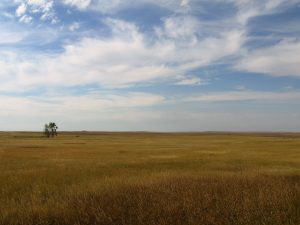 Ruth 2:17-23
Ruth 2:17-23
The Lord our God gives generously. This is not what most people expect God to do. They suspect that he is rather stingy, though receiving daily provisions from him. God has not left himself without testimony: He has shown kindness by giving you rain from heaven and crops in their seasons; he provides you with plenty of food and fills your hearts with joy (Acts 14:17). Even faithful believers can fail to bank on God’s goodness when times are tough, the pantry is bare, and available jobs always seem to go to someone else. The book of Ruth reminds us that God provides and teaches how he works out his plan in Christ by many acts of kindness to and through his people.
The first surprise came when Ruth found out how much she earned for the day (2:17-19). After gleaning, Ruth still had hard work to do, because she had to separate the barley grain from the stalk. She would have had to beat the stalks with a curved stick or wooden hammer, which separated the husks from the kernels, and then gather the kernels together. This would be tedious, time-consuming work. When finished, she probably gathered the kernels together on her shawl, and then carried them home on her back. Ruth was probably exhausted at this point. She discovered that she had gathered about five gallons of grain. This would be enough to feed them for a couple weeks. In their reckoning, this would be about two week’s wages. So Ruth did quite well that day.
Naomi was pleasantly surprised about what Ruth brought home. Ruth gave Naomi her leftover roasted grain from lunch. She knew how much Naomi would enjoy it. This shows Ruth’s generous and loyal nature. When Naomi took all this in, she realized that Ruth had to have received help to achieve all this. For this reason, Naomi had many questions to ask in her excitement. She also prayed for a blessing on her benefactor. Notice how praying for God to bless someone was part of her life now, since she saw a token of God’s goodness to her. Prayer should be as natural to us as breathing. It should be part of our conversation at appropriate times. Ruth revealed her benefactor’s name. Notice how she said his name last, which is also the word order in the Hebrew text. You can see how she let the suspense build, as one woman might do in talking to another. Though the narrator has let us in on some of the significance of Boaz (2:1), Ruth did not yet know this information. Up to this point, Boaz had simply been a kind man to her. When was the last time that you were pleasantly surprised by God’s blessings to you? Do you notice how much the Lord gives you constantly?
Naomi celebrated kindness received (2:20-23). She began to worship. In an instant, Naomi understood that the Lord had not abandoned her! Everything was not as hopeless as she had thought. God was not attacking her, but was helping her through some tough circumstances.
Naomi again prayed for God’s blessing on Boaz. He was not present for her to thank him, which she ought to do, but she did what she could at that moment. God only expects us to do what we can in our situation. Praying for God’s blessing on someone is the best thanks we can give. Do we have this on our minds, so that when such situations arise, words of blessing come from us? This is an area of life in which we must become more properly spiritual.
Naomi realized that she had received kindness. Grammatically, this can refer to either the Lord or Boaz, but I think it is better to refer it to the Lord, since it is difficult to understand how Boaz could have been such a source of kindness to Naomi over the years. (Notice that she says, “He has not stopped showing his kindness….”) So then, Naomi knew that God was still involved in her life and continued to show her kindness, which is steadfast, loyal love, kindness and mercy rolled into one.
Naomi explained the significance of Boaz to Ruth. We must remember that Ruth was from Moab, and there would be much about life under the law covenant that she did not understand. Naomi assured Ruth that Boaz was the close relative and kinsman-redeemer of both of them. The kinsman-redeemer had various duties in the clan:
- He was responsible for the repurchase of property once owned by clan members but sold from economic necessity (Leviticus 25:25-30; cf. Jeremiah 32:1-15).
- If financially able, he also redeemed relatives whose poverty had forced them to sell themselves into slavery (Leviticus 25:47-55). It is on this point that the rest of the book of Ruth
- He had the duty to avenge the killing of a relative by tracking down and executing the killer (Numbers 35:12, 19-27; Deuteronomy 19:6, 12: Joshua 20:2-3, 5, 9).
- He received the money paid to the clan as restitution committed against a deceased clan member (Numbers 5:8).
Ruth and Naomi were able to celebrate what had happened.
The women agreed that Ruth should only work in Boaz’ fields. Besides obvious reasons, why would Naomi urge Ruth to stay in a place where God was blessing her? She would do this, because she had left the place of God’s blessing ten years before, and she doesn’t want Ruth to repeat her mistake!
Ruth was able to glean until the completion of the barley and wheat harvests. The point is that God continually provided for them. It was not just one good day, but many good days had come!
Rejoice in what the Lord gives you. In Ruth’s case she had to work very hard throughout the entire harvest to get food for them. And at the end of the harvest period, she was still living with her mother-in-law and waiting for a marriage proposal. The Lord blessed her, but her life was not “perfect”—whatever we assume that means. If we choose to be very honest, all of us have to admit that there are some items on our wish list that we want to receive immediately. But don’t allow what you lack to hinder your gratitude for what the Lord has already provided. Thank God continually for present blessings, while you wait for what he will do in his time.
Grace and peace, David

 Ruth 2:1-7
Ruth 2:1-7 2 Timothy 1:16-18
2 Timothy 1:16-18